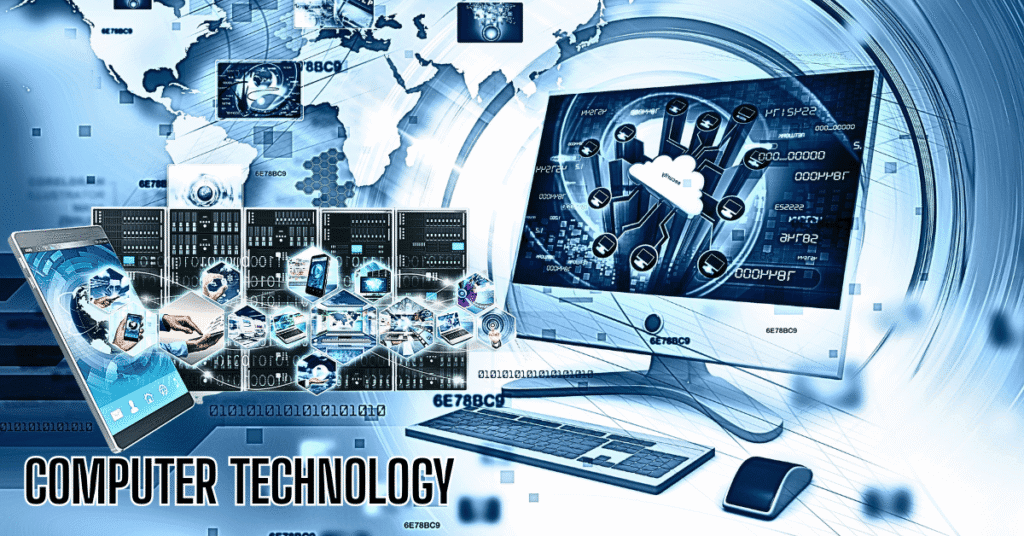Introduction
In a world that is changing rapidly in the 21st century and dramatically touching all sectors of life, computer technology is one of the main forces. The attraction of computer technology has no end—data processing, artificial intelligence, and quantum computing—each revolutionizing everything from our work to our means of communication, education, health, entertainment, and so on.
With this particular work, a unique boundary is explored regarding evolution, manifestations, advantages, problems, and the way forward for computer technology to offer an insight into the knowledge of this dynamic area that simultaneously gives rise to technological innovation, realization, and generative achievement.
1. What Is Computer Technology?
Computer technology includes a wide arena, in general, meaning the development and designing of computer systems and devices, encompassing information processing, storing, and communication. In this definition, hardware (physical components) and software (the operating system, applications, and tools) are included.
Computing technology requires procedures through which extremely complex tasks can be performed precisely and quickly, and with high efficiency. Hence, it is the foundation of the concept of a modern digital infrastructure.
2. A Brief History of Computer Technology
The birth of computer technology started with a simple mechanical device, less than a meter in size, to an awesome machine, equally capable of handling trillions of calculations per second.
Early Innovations
The Abacus (circa 2400 BC): This is the oldest-known tool for computation.
The Modern Era of Computing
- 1950s-1960s: Mainframe computers in large organizations
- 1970s: The birth of microprocessors shifted computer use to personal computers.
- 1980s and 1990s: Personal computing became popular, as did the graphical user interface.
- 2000s to Date: The rise of mobile computing, cloud computing, and artificial intelligence.
3. Components of Modern Computer Technology
Modern computers are made of a network of many kinds of components working together effectively.
Hardware Components
- Central Processing Unit (CPU): The brain of the computer.
- Memory (RAM): A short-term storage for data during processing.
- Storage Devices (HDDs, SSDs): For long-term data storage.
- Input Devices: Keyboard, mouse, and touchscreen, for example.
- Output devices: Monitors, printers, and speakers are just a few.
Software Components
- The operating system controls the software associated with it, operates hardware resources, and is responsible for boot operations (like Windows or macOS, or Linux).
- All application software is are program developed to cater to a specific task (like, for example, Microsoft Word or Photoshop).
- These are the languages used to write such programs (like, for example, Python, Java, or C++).
4. Types of Computer Technology
The computer tech can be classified based on their use and function.
1. Personal Computers (PCs)
Used for tasks that individuals have done: web surfing, gaming, and office work.
2. Servers
Machines can be regarded as a powerful data storing and handling network resource.
3. Supercomputers
Used for research, for weather forecasting, or simulator tests.
4. Embedded Systems
Embedded in devices such as different industrial machines, microwaves, washing machines, and cars.
5. Mobile Devices
Smartphones and tablets run mobile operating systems.
5. Applications of Computer Technology in Daily Life
Computer technology has penetrated life to a degree where it eases everyday tasks.
Communication:
- Mail, from sending Emails to chatting over the Internet.
- Social media on this planet has a thousand names, but Facebook, Instagram, and Twitter seem popular.
Education:
- These are educational platforms: Coursera, Khan Academy.
- Virtual classrooms and digital libraries.
Entertainment
- Streaming on Netflix and YouTube.
- Gaming consoles and massive online multiplayer games.
Shopping
- Other names given to e-commerce websites are Alibaba, Amazon, and eBay.
- Digital Payment Systems (PayPal, Google Pay).
6. Role of Computer Technology in Different Sectors
1. Healthcare
- Electronic health records (EHRs)
2. Business and Finance
- Automation of accounting and payroll systems
3. Education
- Learning management systems (LMS)
- Interactive whiteboards and virtual labs
- AI-based personalized learning tools
4. Government and Public Services
- Digital identity systems
- E-governance platforms for tax filing and documentation
5. Agriculture
- Automated irrigation and harvesting
7. Advantages of Information Technology
The advantages provided by information technology are numerous.
1. Speed and Efficiency
What used to take hours now takes seconds.
2. Accuracy
Minimizes errors performed by a human being on calculations, data entry, and decision-making.
3. Storage
The possibility of keeping enormous amounts of data on small devices.
4. Connectivity
Gives uninterrupted communication across the globe in real time.
5. Innovation
Assists with research, creativity, and development of new products and services.
8. Challenges and Concerns
Nevertheless, the very computer technology has some challenges:
Cybersecurity Threats
- Hacking of Data and Identity Theft
- Malware, ransomware, phishing
Digital Divide
- Technology is not well entrenched in rural locations as compared to urban areas.
- Socio-economic barriers to digital literacy.
Job Displacement
- Replacing manual labor with automation and AI.
- Continuous reskilling and upskilling will be essential.
Privacy Concerns
- Unauthorized Data Collection.
- Tracking and surveillance with the tech firms.
9. Future of Computer Technology
There are many new, exciting possibilities and innovations in the future of computer technology.
Artificial Intelligence (AI)
AI endorses new methodologies of computer thought and decision-making, from chatbots to self-driving cars.
Quantum Computing
This promises to develop quantum computers that will solve composite dilemmas faster than any classical computer.
Conclusion
Computer technology has matured from counting tools to intelligent systems that can change the face of this planet. It keeps advancing and is addressing truly global issues in the enhancement of the quality of life.
A great power requires a great responsibility; therefore, humanitarian issues requiring urgent attention, including ethical matters, security, and making technology equally accessible for all, are emerging.
This will set us on the path of innovation, which, if we remain educated, will help in reaping the full benefits of computer technology for a greater, smarter, interconnected, and sustainable future.



